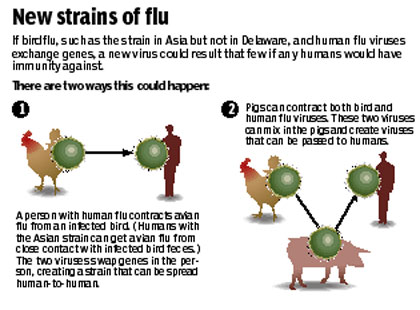|
|
Super Bugs, Bird Flu Worry Experts
The Wall Street Journal
November 1, 2004

"Google" Image
Infectious-disease experts are calling for global surveillance and greater investment to fight what they called a "shadow epidemic" of drug-resistant diseases.
Researchers, at a conference in Washington, said resistant versions of germs such as klebsiella and pseudomonas are making hospital infections harder and costlier to treat. Malaria that is resistant to chloroquine, the cheapest drug for the parasite, has increased the cost of cure by 1,000%.
"We're calling it a shadow epidemic because it brings darkness over all epidemics," said Stuart Levy, professor of medicine at Tufts University, and president of the Alliance for Prudent Use of Antibiotics, in an interview. At the Interscience Conference on Antimicrobials and Chemotherapy, the annual meeting of the American Society for Microbiology yesterday, his group issued a report that proposed some Homeland Security program monies be used to monitor and fight natural epidemics complicated by the rise of resistant germs.
Weekend sessions of the four-day meeting, which ends tomorrow, also featured new reports on the threat posed by bird flu in Asia, and new options to treat the problem of drug-resistant HIV/AIDS.
Since the late 1990s, avian flu has caused disease in humans in Asia, mostly in people working or living near sick chickens. But experts fear that, under certain conditions, bird flu and human flu could exchange genes and launch a pandemic.
On Friday, the World Health Organization said healthy ducks also can carry the avian flu strain, also known as H5N1 virus. Unlike chickens that get sick, the ducks stay healthy-looking and can still spread flu to humans. Infected ducks may have been the source of a small cluster of flu cases in Thailand, where a mother got it from her child.
That "short, dead-end chain of infection in humans" didn't launch the feared pandemic, said Klaus Stohr, a flu expert from the World Health Organization. Still, "there is the potential every second, every moment, that this H5N1 virus will exchange its genetic material if there is a co-infection in a human," Dr. Stohr said. "These clusters look as they would if a pandemic [were to] appear. So they have to be investigated."
Dr. Stohr said lab experiments suggest that certain flu drugs called neuraminidase inhibitors work as treatments against avian flu. This family includes oseltamivir, sold as Tamiflu, and zanamivir, sold as Relenza. However, avian flu is resistant to other flu drugs such as amantidine and rimantidine, he added.
So far, no vaccine exists to protect people against the avian strain. The National Institute of Allergy and Infectious Diseases, a unit of the National Institutes of Health, in May awarded contracts to Aventis Pasteur Inc., the vaccines unit of Sanofi-Aventis SA of France, and Chiron Corp., based in Emeryville, Calif., to develop and test new vaccines to prevent avian flu.
The WHO has called a summit meeting of flu-vaccine makers and nations for Nov. 11 to ramp up plans for dealing with the growing threat of a flu pandemic, the Associated Press reported.
A spate of studies on new AIDS drugs came out yesterday; new AIDS drugs are needed to fill the treatment gap caused by waning power of antiviral drugs against the mutating human immunodeficiency virus. About one in five new HIV infections already is resistant before treatment even starts, according to research from GlaxoSmithKline PLC.
Researchers presented promising results of Glaxo's new drug labeled Glaxo 873140. The drug blocks CCR5, a receptor on human cells targeted by HIV. Part of a drug class known as viral entry blockers, such drugs aim to prevent HIV from infecting cells.
In a small study of 40 patients, all volunteers on the highest doses of the Glaxo drug had a more than 95% drop in blood levels of the virus after 10 days. Early side effects were limited to stomach upset. Findings suggested that the drug's effects continued even when doses were skipped.
In another study, Boehringer Ingelheim Pharmaceuticals Inc. said regimens containing its new AIDS drug tipranavir suppressed blood levels of the virus better than currently available regimens. Side effects included temporary rises in blood lipids and liver enzymes. Boehringer is seeking Food and Drug Administration approval of tipranavir as part of AIDS drug cocktail therapy.
|
|



